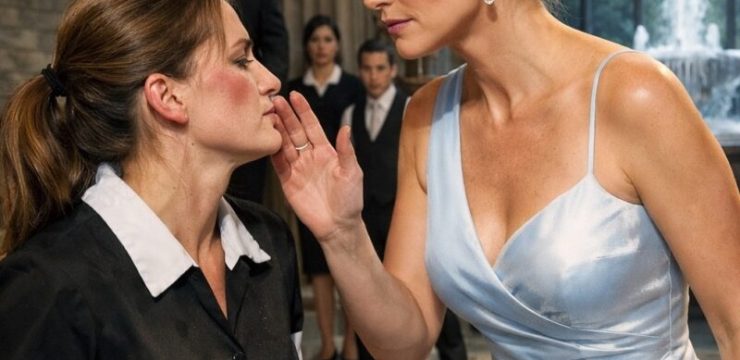The hotel lobby was buzzing with the usual mixture of travelers dragging suitcases, families checking schedules, and business guests impatiently tapping at their phones. My group and I were waiting near the reception desk, killing time while our rooms were being prepared. The large marble floor shimmered beneath the morning lights, thanks to the woman methodically mopping her way across the lobby. She didn’t make eye contact with anyone. She didn’t interrupt or inconvenience anyone. She was simply doing her job quietly and professionally.

That’s when everything shifted.
A young man in an expensive tailored suit strutted through the entrance, walking like the building belonged to him. His posture, his expression, his tone—all of it screamed entitlement. A few employees near the front desk were whispering to each other, clearly uncomfortable. Their glances gave away the truth before anyone said it aloud: this was the CEO’s son.
He didn’t even pause before heading straight toward the woman cleaning the floor. His shoes clicked loudly as if announcing his presence, and he looked at her with annoyance as though she had personally offended him by doing her job.
“This is a hotel, not a train station,” he said sharply. “You should clean before guests arrive—not in the middle of the day.”
The woman slowly looked up, her eyes weary but calm. She didn’t argue. She didn’t defend herself. She simply held his gaze for a small moment before returning to her work. That should have been the end of it—but he wasn’t finished.
With a careless kick, he sent her bucket wobbling, water sloshing across the polished floor. It spread quickly in a small wave, undoing the work she had just completed. He smirked and said, “Clean this up. You’re here to serve people, not get in their way.”
A hush fell over the lobby. Guests stopped mid-conversation. Staff members froze behind the desk. Even the security guards didn’t move, as if unsure whether they were allowed to intervene. But the woman didn’t flinch. Without a word, she steadied the bucket, picked up her mop again, and continued working. There was no anger in her expression—just the quiet strength of someone who had endured worse.
What the young man didn’t know was that someone was watching him very closely—and that someone mattered more than he could imagine.
A few minutes later, we saw the hotel CEO himself walk into the lobby. He had witnessed the entire scene, though his son hadn’t noticed him in the background. The CEO’s face was stern, but not with the anger of someone embarrassed—it was the disappointment of a man who had just seen his own child reveal a side of himself he hoped didn’t exist.
The young man walked toward him, smiling proudly as if expecting praise for “correcting” an employee. Instead, his father’s voice cut through the air.
“Follow me. Now.”
They disappeared into an office near the reception area, and though the conversation was private, the outcome spread quickly among staff by the end of the day. The CEO had fired his own son from the company. No exceptions. No favoritism. No special treatment. He made it clear that anyone who disrespected another human being—especially an employee performing essential work—had no place representing the hotel.
But the story didn’t end there.
A few weeks later, something unexpected happened. The young man returned—but not in a suit, and not as a member of management. This time, he wore a simple uniform, a cleaning cart in front of him, and a badge that identified him as part of the janitorial team. He had chosen to start over—completely—from the bottom.
People whispered, unsure whether it was punishment or redemption. But day by day, it became clear: he was genuinely trying. He arrived early, stayed late, learned how difficult and exhausting the job truly was, and slowly earned the respect of the employees he once overlooked. For the first time in his life, he was seeing the world from a different angle—one where effort mattered more than titles, and where dignity couldn’t be taken for granted.
Months passed. The young man continued showing dedication and humility. His transformation didn’t go unnoticed. Eventually, he was promoted to Director of Human Development, a role focused on improving working conditions, creating training programs, and ensuring that every employee—from cleaners to managers—felt valued and protected. It was a position that required empathy, understanding, and a true sense of fairness, qualities he had once lacked but had since taken to heart.
One afternoon, long after the lobby incident had faded from public memory, he crossed paths with the woman who had been cleaning the floor that day. She was no longer working alone; she was now supervising a small team, respected by the staff and known for her reliability. When their eyes met, he didn’t look away. Instead, he offered her a sincere, humble smile filled with gratitude for the lesson she had unknowingly taught him.
She returned his smile—quiet, steady, and knowing. She understood that his journey had changed him, that the arrogance he once carried had been replaced by empathy. Neither of them spoke. They didn’t need to. Their shared moment said everything.
The young man never forgot that day in the lobby. And from that moment forward, he made it his mission to build a work environment where no one—no matter their job—would ever feel small or disrespected again.





